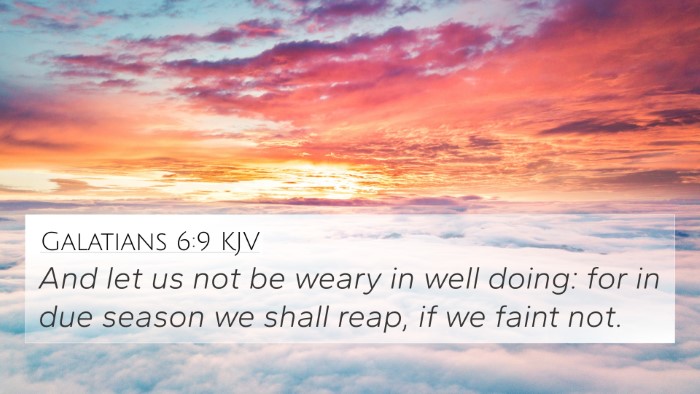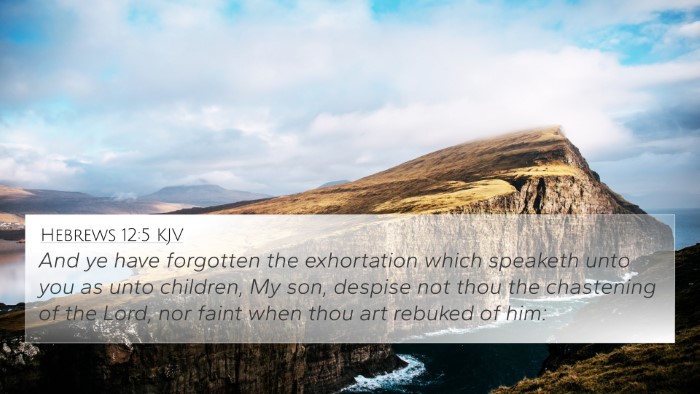Understanding 2 Thessalonians 3:13
Bible Verse: 2 Thessalonians 3:13 - "But as for you, brethren, do not grow weary in doing good."
This verse from the Apostle Paul's second letter to the Thessalonians serves as both an encouragement and a caution to the church. Paul addresses the believers directly, reinforcing the importance of perseverance in good deeds despite challenges.
Meaning and Interpretation
The verse emphasizes the need for steadfastness in doing good, regardless of external circumstances. The admonition not to grow weary in doing good indicates that there may be struggles which could lead believers to lose heart.
Contextual Analysis
In the broader context of 2 Thessalonians, Paul discusses issues of idleness and the importance of maintaining a diligent Christian lifestyle. The surrounding verses highlight the contrast between believers who work hard in their faith and those who fall into laziness.
Commentary Insights
- Matthew Henry: He notes that the verse serves as a reminder of the Christian's duty to consistently do good. Henry emphasizes that weariness can come in various forms—spiritual lethargy, discouragement, or apathy—but believers must remain committed to righteousness.
- Albert Barnes: Barnes explains that Paul encourages the church to expect challenges in their pursuit of good, yet reassures them that their efforts are not in vain. The focus is on the long-term benefits of maintaining good works even when immediate results seem lacking.
- Adam Clarke: Clarke suggests that Paul’s exhortation resonates deeply within the community of believers, acknowledging that doing good often coincided with opposition. He stresses the joy inherent in serving others, which fuels the ongoing commitment to good deeds.
Cross-References
The following Bible verses relate thematically and contextually to 2 Thessalonians 3:13:
- Galatians 6:9: "And let us not grow weary while doing good, for in due season we shall reap if we do not lose heart."
- 1 Corinthians 15:58: "Therefore, my beloved brethren, be steadfast, immovable, always abounding in the work of the Lord, knowing that your labor is not in vain in the Lord."
- Ephesians 6:8: "Knowing that whatever good anyone does, he will receive the same from the Lord, whether he is a slave or free."
- 2 Timothy 4:7-8: "I have fought the good fight, I have finished the race, I have kept the faith. Finally, there is laid up for me the crown of righteousness..."
- Romans 12:21: "Do not be overcome by evil, but overcome evil with good."
- Hebrews 10:24-25: "And let us consider how we may spur one another on toward love and good deeds, not giving up meeting together..."
- Titus 2:14: "Who gave Himself for us, that He might redeem us from every lawless deed and purify for Himself His own special people, zealous for good works."
Connecting Themes
The verse encourages a deeper examination of the role of good works in the Christian life, aligning with several central themes in Scripture:
- Consistency in Faith: Believers are urged to ensure their faith is evidenced through continuous good works.
- Reward for Perseverance: The promise of a future reward for those who remain steadfast in their good deeds is a common biblical principle.
- Community Support: Encouraging one another in the pursuit of good actions reinforces the interconnectedness of the body of Christ.
Practical Applications
The message of 2 Thessalonians 3:13 can be applied in various contexts of everyday life:
- Personal Life: Engage in daily acts of kindness, charity, and goodness, trusting that these actions contribute to a larger purpose.
- Church Activities: Encourage fellow members to continue serving the community, especially when they feel discouraged or unrecognized.
- Workplace Environment: Maintain integrity and a positive attitude, recognizing that your efforts can have a lasting impact on colleagues and clients.
Conclusion
In summary, 2 Thessalonians 3:13 stands out as a significant encouragement for believers to persist in good works. By understanding its context and interconnections with other scriptures, one can appreciate the depth of its message and its relevance in today's Christian walk.


















